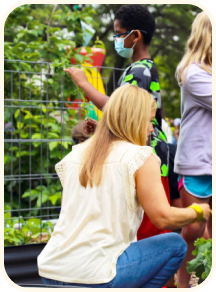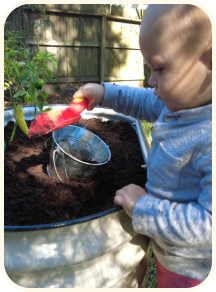Skip to content
Not all insects are bad for your garden – in fact, it is recommended to attract a few varieties of insects that help keep your garden and flower beds healthy, and as natural pest control.
There are many insects that can be helpful to the home gardener. Not only can these beneficial insects help keep pests at bay, some even help pollinate crops and flowers as well, thereby improving your natural landscape.
Essentially, there are three types of beneficial insects: predators, pollinators, and parasitoids. Predatory insects eat large numbers of other insects. Some of these predatory insects feed on only certain types of insects, while others feed on a wide variety.
Common predaceous garden insects include lady beetles, praying mantis, ground beetles, damsel bugs, and snakeflies. Meanwhile, bumblebees, orchard mason bees, and syrphid flies are the most important pollinators found in most home gardens.
Creating a habitat for beneficial insects
If you want to invite beneficial insects to your garden, provide them with food and shelter they need for survival. It’s that simple.
In most cases, this means planting a variety of plants and flowers that can either be a food source, or a host to the insects they feed on. In addition, if you create an ideal environment where they can live, nest and lay eggs – they will start making it their home.
Consider planting herbs like basil, mint, and cilantro. These not only attract beneficial insects, but serve as companion plants that can deter pests. Apart from garden herbs, plants known to attract beneficial insects also include fennel, yarrow, and clover.
Beneficial insects also need water to thrive. If you do not have an irrigation system for your garden, spray your plants in the morning to provide enough water and keep them moist.
Your helpful garden allies
Given that you have avoided using pesticides, and have a variety of insect-friendly plants growing, you may find many little allies already present in your garden. The ones you’re likely to see include lady beetles, praying mantis, lacewings, hover flies, and wasps.
They can be divided into two main categories: those that eat their prey directly and those that deposit their eggs on or into their host. Let’s learn more below about a few of the best beneficials to have in your garden to help you fend off pests, and keep your plants in optimal health.
Praying mantis
With its lanky, stick-like body and signature triangular head, the praying mantis can seem rather menacing. But this strange looking bug is actually a gardener’s best friend, and is a major predator of insects in the garden.
Unfortunately, the praying mantis does not discriminate in terms of prey. They will eat all kinds of insects – both good and bad, while they are great for keeping insect populations under control in the garden. This is true even of their own species, as they will sometimes attack each other.
Lady beetle
Lady beetles prey on a variety of garden pests, with different species preferring different types of prey. Adult lady beetles are flighty, and will roam from one garden to the next in search of food. That being said, the ones that do stay will be a big help against pests in general.
Hoverfly
Hoverflies resemble small bees with their striped abdomens, but they are more like flies in flight: going from plant to plant, and hovering briefly before landing. They are one of the most conspicuous beneficial insects found in gardens. Attracted by pollen and nectar from a variety of flowers, they lay their eggs near aphids and other pests. Their larvae can eat up to 60 aphids per day.
Green lacewing
The green lacewing is another trusted garden helper, and loves to dine on aphids, whiteflies and leafhoppers – all of which can be detrimental to your garden. Bright green in color and with compound eyes, they are hard to miss. They are especially attracted to herbs like coriander and coreopsis plants, as well as flowers like dandelions.
Alfons C.
Based in Shanghai, Alfons is a copywriting and marketing expert, with extensive experience in brand content and copywriting, as well as managing creative campaigns for both advertising agencies and renowned brands at agencies such as Leo Burnett and BCW, and We Are Social. He is a graduate of Goldsmiths College, University of London, and originally from Vancouver, Canada.
Get A 5% OFF + Free Shipping*
Be the first to know about our discounts, and get $15 off your next order of $199 + free shipping
Get Your Coupon
Please enable JavaScript to view the
comments powered by Disqus.
Alfons C.
Based in Shanghai, Alfons is a copywriting and marketing expert, with extensive experience in brand content and copywriting, as well as managing creative campaigns for both advertising agencies and renowned brands at agencies such as Leo Burnett and BCW, and We Are Social. He is a graduate of Goldsmiths College, University of London, and originally from Vancouver, Canada.
Get A 5% OFF + Free Shipping*
Be the first to know about our discounts, and get $15 off your next order of $199 + free shipping
Get Your Coupon
{"39495389741091":{"discounted":true,"percent":true,"caCompareAtPrice":32995},"39495389773859":{"discounted":true,"percent":true,"caCompareAtPrice":32995},"39495389806627":{"discounted":true,"percent":true,"caCompareAtPrice":32995},"39495389839395":{"discounted":true,"percent":true,"caCompareAtPrice":32995},"39573841346595":{"discounted":true,"percent":true,"caCompareAtPrice":60295.00000000001},"39569223417891":{"discounted":true,"percent":true,"caCompareAtPrice":75395},"39573841379363":{"discounted":true,"percent":true,"caCompareAtPrice":60295.00000000001},"39569223450659":{"discounted":true,"percent":true,"caCompareAtPrice":75395},"39573841412131":{"discounted":true,"percent":true,"caCompareAtPrice":60295.00000000001},"39569223483427":{"discounted":true,"percent":true,"caCompareAtPrice":75395},"39573841444899":{"discounted":true,"percent":true,"caCompareAtPrice":60295.00000000001},"39569223516195":{"discounted":true,"percent":true,"caCompareAtPrice":75395},"40120774852643":{"discounted":true,"percent":true,"caCompareAtPrice":60295.00000000001},"40120774885411":{"discounted":true,"percent":true,"caCompareAtPrice":75395},"40120774918179":{"discounted":true,"percent":true,"caCompareAtPrice":60295.00000000001},"40120774950947":{"discounted":true,"percent":true,"caCompareAtPrice":75395},"40120774983715":{"discounted":true,"percent":true,"caCompareAtPrice":60295.00000000001},"40120775016483":{"discounted":true,"percent":true,"caCompareAtPrice":75395},"40120775049251":{"discounted":true,"percent":true,"caCompareAtPrice":60295.00000000001},"40120775082019":{"discounted":true,"percent":true,"caCompareAtPrice":75395},"39458935832611":{"discounted":true,"percent":true,"caCompareAtPrice":68495},"39458935767075":{"discounted":true,"percent":true,"caCompareAtPrice":68495},"39458935865379":{"discounted":true,"percent":true,"caCompareAtPrice":68495},"39458935799843":{"discounted":true,"percent":true,"caCompareAtPrice":68495},"39903464947747":{"discounted":true,"percent":true,"caCompareAtPrice":16495},"39903464980515":{"discounted":true,"percent":true,"caCompareAtPrice":16495},"39903465046051":{"discounted":true,"percent":true,"caCompareAtPrice":16495},"39903465013283":{"discounted":true,"percent":true,"caCompareAtPrice":16495},"39903480250403":{"discounted":true,"percent":true,"caCompareAtPrice":13695},"39903480152099":{"discounted":true,"percent":true,"caCompareAtPrice":13695},"39903480184867":{"discounted":true,"percent":true,"caCompareAtPrice":13695},"39903480217635":{"discounted":true,"percent":true,"caCompareAtPrice":13695},"39903467896867":{"discounted":true,"percent":true,"caCompareAtPrice":24695},"39903467962403":{"discounted":true,"percent":true,"caCompareAtPrice":24695},"39903467995171":{"discounted":true,"percent":true,"caCompareAtPrice":24695},"39903467929635":{"discounted":true,"percent":true,"caCompareAtPrice":24695},"39458936389667":{"discounted":true,"percent":true,"caCompareAtPrice":78095},"39458936324131":{"discounted":true,"percent":true,"caCompareAtPrice":78095},"39458936422435":{"discounted":true,"percent":true,"caCompareAtPrice":78095},"39458936356899":{"discounted":true,"percent":true,"caCompareAtPrice":78095},"33028107501603":{"discounted":true,"percent":true,"caCompareAtPrice":29995},"39279009136675":{"discounted":true,"percent":true,"caCompareAtPrice":29995},"39279009169443":{"discounted":true,"percent":true,"caCompareAtPrice":29995},"33028107534371":{"discounted":true,"percent":true,"caCompareAtPrice":29995},"40149904130083":{"discounted":true,"percent":true,"caCompareAtPrice":29995},"40157716578339":{"discounted":true,"percent":true,"caCompareAtPrice":29995},"40229600591907":{"discounted":true,"percent":true,"caCompareAtPrice":29995},"33028104650787":{"discounted":true,"percent":true,"caCompareAtPrice":36995},"39509370765347":{"discounted":true,"percent":true,"caCompareAtPrice":36995},"39279430959139":{"discounted":true,"percent":true,"caCompareAtPrice":36995},"39509370863651":{"discounted":true,"percent":true,"caCompareAtPrice":36995},"33028104683555":{"discounted":true,"percent":true,"caCompareAtPrice":36995},"39509370798115":{"discounted":true,"percent":true,"caCompareAtPrice":36995},"39279430893603":{"discounted":true,"percent":true,"caCompareAtPrice":36995},"39509370830883":{"discounted":true,"percent":true,"caCompareAtPrice":36995},"40149955215395":{"discounted":true,"percent":true,"caCompareAtPrice":38995},"40149961637923":{"discounted":true,"percent":true,"caCompareAtPrice":36995},"40157728243747":{"discounted":true,"percent":true,"caCompareAtPrice":38995},"40157728276515":{"discounted":true,"percent":true,"caCompareAtPrice":36995},"40231723794467":{"discounted":true,"percent":true,"caCompareAtPrice":38995},"40231723827235":{"discounted":true,"percent":true,"caCompareAtPrice":36995},"39903477334051":{"discounted":true,"percent":true,"caCompareAtPrice":30195},"39903477366819":{"discounted":true,"percent":true,"caCompareAtPrice":31595},"39903477399587":{"discounted":true,"percent":true,"caCompareAtPrice":30195},"39903477432355":{"discounted":true,"percent":true,"caCompareAtPrice":31595},"39903477465123":{"discounted":true,"percent":true,"caCompareAtPrice":30195},"39903477497891":{"discounted":true,"percent":true,"caCompareAtPrice":31595},"39903477530659":{"discounted":true,"percent":true,"caCompareAtPrice":30195},"39903477563427":{"discounted":true,"percent":true,"caCompareAtPrice":31595},"39302886096931":{"discounted":true,"percent":true,"caCompareAtPrice":26095},"39302886031395":{"discounted":true,"percent":true,"caCompareAtPrice":26095},"39302885998627":{"discounted":true,"percent":true,"caCompareAtPrice":26095},"39302886064163":{"discounted":true,"percent":true,"caCompareAtPrice":26095},"39457200799779":{"discounted":true,"percent":true,"caCompareAtPrice":36995},"39457200734243":{"discounted":true,"percent":true,"caCompareAtPrice":36995},"39457200832547":{"discounted":true,"percent":true,"caCompareAtPrice":36995},"39457200767011":{"discounted":true,"percent":true,"caCompareAtPrice":36995},"39903460065315":{"discounted":true,"percent":true,"caCompareAtPrice":19195},"39903460098083":{"discounted":true,"percent":true,"caCompareAtPrice":19195},"39903460163619":{"discounted":true,"percent":true,"caCompareAtPrice":19195},"39903460130851":{"discounted":true,"percent":true,"caCompareAtPrice":19195},"33018842087459":{"discounted":true,"percent":true,"caCompareAtPrice":26095},"39279001403427":{"discounted":true,"percent":true,"caCompareAtPrice":26095},"33018842120227":{"discounted":true,"percent":true,"caCompareAtPrice":32995},"39278877605923":{"discounted":true,"percent":true,"caCompareAtPrice":32995},"40149905244195":{"discounted":true,"percent":true,"caCompareAtPrice":32995},"40157718347811":{"discounted":true,"percent":true,"caCompareAtPrice":32995},"40229606555683":{"discounted":true,"percent":true,"caCompareAtPrice":32995},"39490604466211":{"discounted":true,"percent":true,"caCompareAtPrice":20595},"39490604498979":{"discounted":true,"percent":true,"caCompareAtPrice":20595},"39490604564515":{"discounted":true,"percent":true,"caCompareAtPrice":20595},"39490604531747":{"discounted":true,"percent":true,"caCompareAtPrice":20595},"40149901279267":{"discounted":true,"percent":true,"caCompareAtPrice":20595},"40157715431459":{"discounted":true,"percent":true,"caCompareAtPrice":20595},"39948202377251":{"discounted":true,"percent":true,"caCompareAtPrice":30195},"39948202410019":{"discounted":true,"percent":true,"caCompareAtPrice":30195},"39948202311715":{"discounted":true,"percent":true,"caCompareAtPrice":30195},"39948202344483":{"discounted":true,"percent":true,"caCompareAtPrice":30195},"39253770141731":{"discounted":true,"percent":true,"caCompareAtPrice":27495},"39253770174499":{"discounted":true,"percent":true,"caCompareAtPrice":27495},"39253770240035":{"discounted":true,"percent":true,"caCompareAtPrice":27495},"39253770207267":{"discounted":true,"percent":true,"caCompareAtPrice":27495},"39569227382819":{"discounted":true,"percent":true,"caCompareAtPrice":27395},"39569227415587":{"discounted":true,"percent":true,"caCompareAtPrice":27395},"39569227448355":{"discounted":true,"percent":true,"caCompareAtPrice":27395},"39569227481123":{"discounted":true,"percent":true,"caCompareAtPrice":27395},"40073502097443":{"discounted":true,"percent":true,"caCompareAtPrice":48795},"40073502130211":{"discounted":true,"percent":true,"caCompareAtPrice":48795},"40073502162979":{"discounted":true,"percent":true,"caCompareAtPrice":48795},"40073502195747":{"discounted":true,"percent":true,"caCompareAtPrice":48795},"39490596012067":{"discounted":true,"percent":true,"caCompareAtPrice":31595},"39490596044835":{"discounted":true,"percent":true,"caCompareAtPrice":31595},"39490595979299":{"discounted":true,"percent":true,"caCompareAtPrice":31595},"39490595946531":{"discounted":true,"percent":true,"caCompareAtPrice":31595},"40149985001507":{"discounted":true,"percent":true,"caCompareAtPrice":31595},"40157713072163":{"discounted":true,"percent":true,"caCompareAtPrice":31595},"33042263932963":{"discounted":true,"percent":true,"caCompareAtPrice":45295},"33042263965731":{"discounted":true,"percent":true,"caCompareAtPrice":45295},"39278875476003":{"discounted":true,"percent":true,"caCompareAtPrice":45295},"39279009792035":{"discounted":true,"percent":true,"caCompareAtPrice":45295},"40149988737059":{"discounted":true,"percent":true,"caCompareAtPrice":45295},"40157717430307":{"discounted":true,"percent":true,"caCompareAtPrice":45295},"40538642743331":{"discounted":true,"percent":true,"caCompareAtPrice":45295},"32893235068963":{"discounted":true,"percent":true,"caCompareAtPrice":21995},"39359510183971":{"discounted":true,"percent":true,"caCompareAtPrice":21995},"39359510380579":{"discounted":true,"percent":true,"caCompareAtPrice":21995},"39359509626915":{"discounted":true,"percent":true,"caCompareAtPrice":21995},"39302847758371":{"discounted":true,"percent":true,"caCompareAtPrice":20595},"33033504161827":{"discounted":true,"percent":true,"caCompareAtPrice":20595},"39302847266851":{"discounted":true,"percent":true,"caCompareAtPrice":20595},"39302847528995":{"discounted":true,"percent":true,"caCompareAtPrice":20595},"39458927509539":{"discounted":true,"percent":true,"caCompareAtPrice":50695},"39458927444003":{"discounted":true,"percent":true,"caCompareAtPrice":50695},"39458927542307":{"discounted":true,"percent":true,"caCompareAtPrice":50695},"39458927476771":{"discounted":true,"percent":true,"caCompareAtPrice":50695},"39457181958179":{"discounted":true,"percent":true,"caCompareAtPrice":50695},"39457181892643":{"discounted":true,"percent":true,"caCompareAtPrice":50695},"39457181990947":{"discounted":true,"percent":true,"caCompareAtPrice":50695},"39457181925411":{"discounted":true,"percent":true,"caCompareAtPrice":50695},"33042261409827":{"discounted":true,"percent":true,"caCompareAtPrice":38495},"33042261442595":{"discounted":true,"percent":true,"caCompareAtPrice":38495},"39279010742307":{"discounted":true,"percent":true,"caCompareAtPrice":38495},"39279010709539":{"discounted":true,"percent":true,"caCompareAtPrice":38495},"40149986869283":{"discounted":true,"percent":true,"caCompareAtPrice":38495},"40157715529763":{"discounted":true,"percent":true,"caCompareAtPrice":38495},"40538642415651":{"discounted":true,"percent":true,"caCompareAtPrice":38495},"33031990509603":{"discounted":true,"percent":true,"caCompareAtPrice":49995},"39509882863651":{"discounted":true,"percent":true,"caCompareAtPrice":49995},"33031990542371":{"discounted":true,"percent":true,"caCompareAtPrice":49995},"39509882896419":{"discounted":true,"percent":true,"caCompareAtPrice":49995},"39279016345635":{"discounted":true,"percent":true,"caCompareAtPrice":49995},"39509882961955":{"discounted":true,"percent":true,"caCompareAtPrice":49995},"39279016476707":{"discounted":true,"percent":true,"caCompareAtPrice":49995},"39509882929187":{"discounted":true,"percent":true,"caCompareAtPrice":49995},"40149997027363":{"discounted":true,"percent":true,"caCompareAtPrice":49995},"40149998632995":{"discounted":true,"percent":true,"caCompareAtPrice":49995},"40157720936483":{"discounted":true,"percent":true,"caCompareAtPrice":49995},"40157734404131":{"discounted":true,"percent":true,"caCompareAtPrice":49995},"40536780111907":{"discounted":true,"percent":true,"caCompareAtPrice":49995},"39887154577443":{"discounted":true,"percent":true,"caCompareAtPrice":9695},"39593915875363":{"discounted":true,"percent":true,"caCompareAtPrice":2795},"39593915908131":{"discounted":true,"percent":true,"caCompareAtPrice":2795},"39593953296419":{"discounted":true,"percent":true,"caCompareAtPrice":2795},"39593953329187":{"discounted":true,"percent":true,"caCompareAtPrice":2795},"39612941565987":{"discounted":true,"percent":true,"caCompareAtPrice":16495},"39917388333091":{"discounted":true,"percent":true},"39917388365859":{"discounted":true,"percent":true},"39917390135331":{"discounted":true,"percent":true},"39917390168099":{"discounted":true,"percent":true},"39913389490211":{"discounted":true,"percent":true},"39917388398627":{"discounted":true,"percent":true},"39917388431395":{"discounted":true,"percent":true},"39917390200867":{"discounted":true,"percent":true},"40612116004899":{"discounted":true,"percent":true},"40612116037667":{"discounted":true,"percent":true},"39913593077795":{"discounted":true,"percent":true,"caCompareAtPrice":6895},"39913593110563":{"discounted":true,"percent":true,"caCompareAtPrice":9695},"39913593143331":{"discounted":true,"percent":true,"caCompareAtPrice":15195},"39917346193443":{"discounted":true,"percent":true,"caCompareAtPrice":23395},"39663128346659":{"discounted":true,"percent":true},"39663128379427":{"discounted":true,"percent":true},"39922332631075":{"discounted":true,"percent":true,"caCompareAtPrice":6895},"39922332663843":{"discounted":true,"percent":true,"caCompareAtPrice":6895},"39922340003875":{"discounted":true,"percent":true,"caCompareAtPrice":11095},"39922340036643":{"discounted":true,"percent":true,"caCompareAtPrice":11095},"39922340069411":{"discounted":true,"percent":true,"caCompareAtPrice":11095},"39705961496611":{"discounted":true,"percent":true,"caCompareAtPrice":4195},"39705961529379":{"discounted":true,"percent":true,"caCompareAtPrice":5595},"39705961562147":{"discounted":true,"percent":true,"caCompareAtPrice":8295},"39926582870051":{"discounted":true,"percent":true,"caCompareAtPrice":13795},"39869961764899":{"discounted":true,"percent":true,"caCompareAtPrice":6895},"39869961797667":{"discounted":true,"percent":true,"caCompareAtPrice":11095},"39869961830435":{"discounted":true,"percent":true,"caCompareAtPrice":15195},"39936031031331":{"discounted":true,"percent":true,"caCompareAtPrice":17895},"39705945800739":{"discounted":true,"percent":true,"caCompareAtPrice":9695},"39705945767971":{"discounted":true,"percent":true,"caCompareAtPrice":6895},"39705945833507":{"discounted":true,"percent":true,"caCompareAtPrice":13795},"39917346848803":{"discounted":true,"percent":true,"caCompareAtPrice":21995},"39569227644963":{"discounted":true,"percent":true,"caCompareAtPrice":39795},"39569227677731":{"discounted":true,"percent":true,"caCompareAtPrice":39795},"39569227710499":{"discounted":true,"percent":true,"caCompareAtPrice":39795},"39569227743267":{"discounted":true,"percent":true,"caCompareAtPrice":39795},"40006276382755":{"discounted":true,"percent":true,"caCompareAtPrice":36995},"40006276546595":{"discounted":true,"percent":true,"caCompareAtPrice":36995},"40006276775971":{"discounted":true,"percent":true,"caCompareAtPrice":36995},"40006276939811":{"discounted":true,"percent":true,"caCompareAtPrice":36995},"40024456036387":{"discounted":true,"percent":true,"caCompareAtPrice":9595},"40024461049891":{"discounted":true,"percent":true,"caCompareAtPrice":17895},"40021598797859":{"discounted":true,"percent":true,"caCompareAtPrice":9695},"40039271923747":{"discounted":true,"percent":true,"caCompareAtPrice":6895},"40039271956515":{"discounted":true,"percent":true,"caCompareAtPrice":6895},"40039271989283":{"discounted":true,"percent":true,"caCompareAtPrice":6895},"40039272022051":{"discounted":true,"percent":true,"caCompareAtPrice":6895},"40049744576547":{"discounted":true,"percent":true},"40049744609315":{"discounted":true,"percent":true},"40163199975459":{"discounted":true,"percent":true,"caCompareAtPrice":6895},"40163200008227":{"discounted":true,"percent":true,"caCompareAtPrice":6895},"40163199942691":{"discounted":true,"percent":true,"caCompareAtPrice":6895},"40201956589603":{"discounted":true,"percent":true,"caCompareAtPrice":6800},"40201956622371":{"discounted":true,"percent":true,"caCompareAtPrice":8200},"40195291480099":{"discounted":true,"percent":true},"40202236526627":{"discounted":true,"percent":true},"40202236559395":{"discounted":true,"percent":true},"40196235591715":{"discounted":true,"percent":true,"caCompareAtPrice":45295},"40202232037411":{"discounted":true,"percent":true,"caCompareAtPrice":45295},"40202232070179":{"discounted":true,"percent":true,"caCompareAtPrice":45295},"40195093495843":{"discounted":true,"percent":true,"caCompareAtPrice":57595.00000000001},"40202231152675":{"discounted":true,"percent":true,"caCompareAtPrice":57595.00000000001},"40202231185443":{"discounted":true,"percent":true,"caCompareAtPrice":57595.00000000001},"40195095560227":{"discounted":true,"percent":true,"caCompareAtPrice":42495},"40202231447587":{"discounted":true,"percent":true,"caCompareAtPrice":42495},"40202231480355":{"discounted":true,"percent":true,"caCompareAtPrice":42495},"40195099328547":{"discounted":true,"percent":true,"caCompareAtPrice":60295.00000000001},"40202229121059":{"discounted":true,"percent":true,"caCompareAtPrice":60295.00000000001},"40202229153827":{"discounted":true,"percent":true,"caCompareAtPrice":60295.00000000001},"40195099688995":{"discounted":true,"percent":true,"caCompareAtPrice":75395},"40202233937955":{"discounted":true,"percent":true,"caCompareAtPrice":75395},"40202233970723":{"discounted":true,"percent":true,"caCompareAtPrice":75395},"40195100639267":{"discounted":true,"percent":true,"caCompareAtPrice":75395},"40202233151523":{"discounted":true,"percent":true,"caCompareAtPrice":75395},"40202233184291":{"discounted":true,"percent":true,"caCompareAtPrice":75395},"40195240755235":{"discounted":true,"percent":true,"caCompareAtPrice":87695},"40202231283747":{"discounted":true,"percent":true,"caCompareAtPrice":87695},"40202231316515":{"discounted":true,"percent":true,"caCompareAtPrice":87695},"40195260317731":{"discounted":true,"percent":true,"caCompareAtPrice":72695},"40202231873571":{"discounted":true,"percent":true,"caCompareAtPrice":72695},"40202231906339":{"discounted":true,"percent":true,"caCompareAtPrice":72695},"40195273064483":{"discounted":true,"percent":true,"caCompareAtPrice":90495},"40202230857763":{"discounted":true,"percent":true,"caCompareAtPrice":90495},"40202230890531":{"discounted":true,"percent":true,"caCompareAtPrice":90495},"40195346268195":{"discounted":true,"percent":true},"40202236657699":{"discounted":true,"percent":true},"40202236690467":{"discounted":true,"percent":true},"40195281846307":{"discounted":true,"percent":true,"caCompareAtPrice":120595},"40202235969571":{"discounted":true,"percent":true,"caCompareAtPrice":120595},"40202236002339":{"discounted":true,"percent":true,"caCompareAtPrice":120595},"40006833799203":{"discounted":true,"percent":true,"caCompareAtPrice":42495},"40021991882787":{"discounted":true,"percent":true,"caCompareAtPrice":53095.00000000001},"40006833831971":{"discounted":true,"percent":true,"caCompareAtPrice":42495},"40021991948323":{"discounted":true,"percent":true,"caCompareAtPrice":53095.00000000001},"40006833864739":{"discounted":true,"percent":true,"caCompareAtPrice":42495},"40021992013859":{"discounted":true,"percent":true,"caCompareAtPrice":53095.00000000001},"40006833897507":{"discounted":true,"percent":true,"caCompareAtPrice":42495},"40021992079395":{"discounted":true,"percent":true,"caCompareAtPrice":53095.00000000001},"40134115852323":{"discounted":true,"percent":true,"caCompareAtPrice":28395},"40134115885091":{"discounted":true,"percent":true,"caCompareAtPrice":18195},"40134115917859":{"discounted":true,"percent":true,"caCompareAtPrice":26995},"40134115950627":{"discounted":true,"percent":true,"caCompareAtPrice":32095},"40134115983395":{"discounted":true,"percent":true,"caCompareAtPrice":22495},"40134116016163":{"discounted":true,"percent":true,"caCompareAtPrice":25295},"40134116048931":{"discounted":true,"percent":true,"caCompareAtPrice":26995},"40134116081699":{"discounted":true,"percent":true,"caCompareAtPrice":33595},"40134116114467":{"discounted":true,"percent":true,"caCompareAtPrice":37595},"40134116147235":{"discounted":true,"percent":true,"caCompareAtPrice":36295},"40134116180003":{"discounted":true,"percent":true,"caCompareAtPrice":37095},"40134116212771":{"discounted":true,"percent":true,"caCompareAtPrice":27895},"40134116245539":{"discounted":true,"percent":true,"caCompareAtPrice":27995},"40145521180707":{"discounted":true,"percent":true,"caCompareAtPrice":29395},"40233730211875":{"discounted":true,"percent":true,"caCompareAtPrice":800},"40233733259299":{"discounted":true,"percent":true,"caCompareAtPrice":800},"40233729851427":{"discounted":true,"percent":true,"caCompareAtPrice":800},"40233700491299":{"discounted":true,"percent":true,"caCompareAtPrice":800},"40233701376035":{"discounted":true,"percent":true,"caCompareAtPrice":800},"40233729753123":{"discounted":true,"percent":true,"caCompareAtPrice":800},"40227788619811":{"discounted":true,"percent":true,"caCompareAtPrice":800},"40233730801699":{"discounted":true,"percent":true,"caCompareAtPrice":800},"40233696165923":{"discounted":true,"percent":true,"caCompareAtPrice":800},"40233691807779":{"discounted":true,"percent":true,"caCompareAtPrice":800},"40233733750819":{"discounted":true,"percent":true,"caCompareAtPrice":800},"40233731817507":{"discounted":true,"percent":true,"caCompareAtPrice":800},"40233730277411":{"discounted":true,"percent":true,"caCompareAtPrice":800},"40233734209571":{"discounted":true,"percent":true,"caCompareAtPrice":800},"40233730768931":{"discounted":true,"percent":true,"caCompareAtPrice":800},"40233733685283":{"discounted":true,"percent":true,"caCompareAtPrice":800},"40233733554211":{"discounted":true,"percent":true,"caCompareAtPrice":800},"40233782771747":{"discounted":true,"percent":true,"caCompareAtPrice":800},"40233733062691":{"discounted":true,"percent":true,"caCompareAtPrice":800},"40233722839075":{"discounted":true,"percent":true,"caCompareAtPrice":800},"40233732341795":{"discounted":true,"percent":true,"caCompareAtPrice":800},"40233782804515":{"discounted":true,"percent":true,"caCompareAtPrice":800},"40233745481763":{"discounted":true,"percent":true,"caCompareAtPrice":800},"40233782706211":{"discounted":true,"percent":true,"caCompareAtPrice":800},"40233776906275":{"discounted":true,"percent":true,"caCompareAtPrice":800},"40233737584675":{"discounted":true,"percent":true,"caCompareAtPrice":800},"40233779920931":{"discounted":true,"percent":true,"caCompareAtPrice":800},"40233701146659":{"discounted":true,"percent":true,"caCompareAtPrice":800},"40233730965539":{"discounted":true,"percent":true,"caCompareAtPrice":800},"40233733914659":{"discounted":true,"percent":true,"caCompareAtPrice":800},"40233698492451":{"discounted":true,"percent":true,"caCompareAtPrice":800},"40233720774691":{"discounted":true,"percent":true,"caCompareAtPrice":800},"40233698164771":{"discounted":true,"percent":true,"caCompareAtPrice":800},"40233707372579":{"discounted":true,"percent":true,"caCompareAtPrice":800},"40233730506787":{"discounted":true,"percent":true,"caCompareAtPrice":800},"40186969849891":{"discounted":true,"percent":true,"caCompareAtPrice":6895},"40186969882659":{"discounted":true,"percent":true,"caCompareAtPrice":9695},"40186969915427":{"discounted":true,"percent":true,"caCompareAtPrice":12395},"40186969948195":{"discounted":true,"percent":true,"caCompareAtPrice":15195},"39647044567075":{"discounted":true,"percent":true,"caCompareAtPrice":9695},"39647044599843":{"discounted":true,"percent":true,"caCompareAtPrice":16495},"40189384491043":{"discounted":true,"percent":true,"caCompareAtPrice":9695},"40189384523811":{"discounted":true,"percent":true,"caCompareAtPrice":16495},"40189384556579":{"discounted":true,"percent":true,"caCompareAtPrice":9695},"40189384589347":{"discounted":true,"percent":true,"caCompareAtPrice":16495},"40209225613347":{"discounted":true,"percent":true,"caCompareAtPrice":5595},"40251254669347":{"discounted":true,"percent":true,"caCompareAtPrice":9695},"40251276492835":{"discounted":true,"percent":true,"caCompareAtPrice":16495},"40251254702115":{"discounted":true,"percent":true,"caCompareAtPrice":9695},"40251276525603":{"discounted":true,"percent":true,"caCompareAtPrice":16495},"40251254734883":{"discounted":true,"percent":true,"caCompareAtPrice":9695},"40251276558371":{"discounted":true,"percent":true,"caCompareAtPrice":16495},"40251255128099":{"discounted":true,"percent":true,"caCompareAtPrice":5795},"40251276197923":{"discounted":true,"percent":true,"caCompareAtPrice":9695},"40251255160867":{"discounted":true,"percent":true,"caCompareAtPrice":5795},"40251276230691":{"discounted":true,"percent":true,"caCompareAtPrice":9695},"40251255193635":{"discounted":true,"percent":true,"caCompareAtPrice":5795},"40251276263459":{"discounted":true,"percent":true,"caCompareAtPrice":9695},"40246461726755":{"discounted":true,"percent":true,"caCompareAtPrice":17895},"40246461792291":{"discounted":true,"percent":true,"caCompareAtPrice":17895},"40246461759523":{"discounted":true,"percent":true,"caCompareAtPrice":17895},"40327621640227":{"discounted":true,"percent":true},"40329419194403":{"discounted":true,"percent":true,"caCompareAtPrice":3695},"40329419227171":{"discounted":true,"percent":true,"caCompareAtPrice":3695},"40329419259939":{"discounted":true,"percent":true,"caCompareAtPrice":3695},"40327767064611":{"discounted":true,"percent":true,"caCompareAtPrice":6395},"40313739903011":{"discounted":true,"percent":true},"40313740165155":{"discounted":true,"percent":true},"40313740197923":{"discounted":true,"percent":true},"40313730367523":{"discounted":true,"percent":true,"caCompareAtPrice":3695},"40313730498595":{"discounted":true,"percent":true,"caCompareAtPrice":4595},"40313739411491":{"discounted":true,"percent":true,"caCompareAtPrice":3695},"40313739444259":{"discounted":true,"percent":true,"caCompareAtPrice":4595},"40328147238947":{"discounted":true,"percent":true,"caCompareAtPrice":1895},"40328129282083":{"discounted":true,"percent":true,"caCompareAtPrice":2500},"40328147075107":{"discounted":true,"percent":true,"caCompareAtPrice":2795},"40328146747427":{"discounted":true,"percent":true,"caCompareAtPrice":2095},"40376049893411":{"discounted":true,"percent":true,"caCompareAtPrice":5195},"40376049926179":{"discounted":true,"percent":true,"caCompareAtPrice":5195},"40376049958947":{"discounted":true,"percent":true,"caCompareAtPrice":5195},"40331197972515":{"discounted":true,"percent":true,"caCompareAtPrice":8295},"40376060149795":{"discounted":true,"percent":true,"caCompareAtPrice":1895},"40331071422499":{"discounted":true,"percent":true,"caCompareAtPrice":3195},"40237290979363":{"discounted":true,"percent":true,"caCompareAtPrice":6895},"40237291012131":{"discounted":true,"percent":true,"caCompareAtPrice":12395},"40237291044899":{"discounted":true,"percent":true,"caCompareAtPrice":17895},"40237291077667":{"discounted":true,"percent":true,"caCompareAtPrice":21995},"40237295861795":{"discounted":true,"percent":true,"caCompareAtPrice":6895},"40237295927331":{"discounted":true,"percent":true,"caCompareAtPrice":12395},"40237295992867":{"discounted":true,"percent":true,"caCompareAtPrice":17895},"40237296058403":{"discounted":true,"percent":true,"caCompareAtPrice":21995},"40237295829027":{"discounted":true,"percent":true,"caCompareAtPrice":6895},"40237295894563":{"discounted":true,"percent":true,"caCompareAtPrice":12395},"40237295960099":{"discounted":true,"percent":true,"caCompareAtPrice":17895},"40237296025635":{"discounted":true,"percent":true,"caCompareAtPrice":21995},"40092513566755":{"discounted":true,"percent":true},"40446144512035":{"discounted":true,"percent":true},"40446144544803":{"discounted":true,"percent":true},"40446144577571":{"discounted":true,"percent":true},"40446144610339":{"discounted":true,"percent":true},"40446144643107":{"discounted":true,"percent":true},"40446144675875":{"discounted":true,"percent":true},"40446147035171":{"discounted":true,"percent":true,"caCompareAtPrice":43895},"40446147067939":{"discounted":true,"percent":true,"caCompareAtPrice":43895},"40446147100707":{"discounted":true,"percent":true,"caCompareAtPrice":43895},"40446147133475":{"discounted":true,"percent":true,"caCompareAtPrice":43895},"40446147166243":{"discounted":true,"percent":true,"caCompareAtPrice":43895},"40446147199011":{"discounted":true,"percent":true,"caCompareAtPrice":43895},"40446147231779":{"discounted":true,"percent":true,"caCompareAtPrice":43895},"40446145757219":{"discounted":true,"percent":true,"caCompareAtPrice":33195},"40446146412579":{"discounted":true,"percent":true,"caCompareAtPrice":33195},"40446145298467":{"discounted":true,"percent":true,"caCompareAtPrice":33195},"40451782246435":{"discounted":true,"percent":true,"caCompareAtPrice":45295},"40451782279203":{"discounted":true,"percent":true,"caCompareAtPrice":45295},"40451782311971":{"discounted":true,"percent":true,"caCompareAtPrice":45295},"40451782344739":{"discounted":true,"percent":true,"caCompareAtPrice":45295},"40294905085987":{"discounted":true,"percent":true,"caCompareAtPrice":24695},"40294905118755":{"discounted":true,"percent":true,"caCompareAtPrice":24695},"40294905053219":{"discounted":true,"percent":true,"caCompareAtPrice":24695},"40294905151523":{"discounted":true,"percent":true,"caCompareAtPrice":24695},"40294905184291":{"discounted":true,"percent":true,"caCompareAtPrice":24695},"40453863473187":{"discounted":true,"percent":true,"caCompareAtPrice":24695},"40295020134435":{"discounted":true,"percent":true,"caCompareAtPrice":36995},"40295020167203":{"discounted":true,"percent":true,"caCompareAtPrice":36995},"40295020101667":{"discounted":true,"percent":true,"caCompareAtPrice":36995},"40295020199971":{"discounted":true,"percent":true,"caCompareAtPrice":36995},"40295020232739":{"discounted":true,"percent":true,"caCompareAtPrice":36995},"40454193971235":{"discounted":true,"percent":true,"caCompareAtPrice":36995},"40294993756195":{"discounted":true,"percent":true,"caCompareAtPrice":27395},"40294993788963":{"discounted":true,"percent":true,"caCompareAtPrice":27395},"40294993723427":{"discounted":true,"percent":true,"caCompareAtPrice":27395},"40294993821731":{"discounted":true,"percent":true,"caCompareAtPrice":27395},"40294993854499":{"discounted":true,"percent":true,"caCompareAtPrice":27395},"40454190759971":{"discounted":true,"percent":true,"caCompareAtPrice":27395},"40468303413283":{"discounted":true,"percent":true},"40476567601187":{"discounted":true,"percent":true,"caCompareAtPrice":104195},"40476567633955":{"discounted":true,"percent":true,"caCompareAtPrice":104195},"40476567666723":{"discounted":true,"percent":true,"caCompareAtPrice":104195},"40476567699491":{"discounted":true,"percent":true,"caCompareAtPrice":104195},"40476567732259":{"discounted":true,"percent":true,"caCompareAtPrice":104195},"40476567765027":{"discounted":true,"percent":true,"caCompareAtPrice":104195},"40476567797795":{"discounted":true,"percent":true,"caCompareAtPrice":104195},"40481364148259":{"discounted":true,"percent":true},"40481363853347":{"discounted":true,"percent":true},"40481363755043":{"discounted":true,"percent":true},"40481362837539":{"discounted":true,"percent":true},"40481363623971":{"discounted":true,"percent":true},"40481363460131":{"discounted":true,"percent":true},"40481363132451":{"discounted":true,"percent":true},"40481363394595":{"discounted":true,"percent":true},"40481363066915":{"discounted":true,"percent":true},"40481362739235":{"discounted":true,"percent":true},"40481363230755":{"discounted":true,"percent":true},"40481363296291":{"discounted":true,"percent":true},"40481362935843":{"discounted":true,"percent":true},"40481362149411":{"discounted":true,"percent":true},"40481363787811":{"discounted":true,"percent":true},"40481363492899":{"discounted":true,"percent":true},"40481363427363":{"discounted":true,"percent":true},"40481363558435":{"discounted":true,"percent":true},"40481363165219":{"discounted":true,"percent":true},"40481363001379":{"discounted":true,"percent":true},"40481363099683":{"discounted":true,"percent":true},"40481363263523":{"discounted":true,"percent":true},"40481362673699":{"discounted":true,"percent":true},"40481362608163":{"discounted":true,"percent":true},"40481363034147":{"discounted":true,"percent":true},"40481362640931":{"discounted":true,"percent":true},"40481362477091":{"discounted":true,"percent":true},"40481362542627":{"discounted":true,"percent":true},"40481362870307":{"discounted":true,"percent":true},"40481362575395":{"discounted":true,"percent":true},"40481362903075":{"discounted":true,"percent":true},"40481362378787":{"discounted":true,"percent":true},"40481362411555":{"discounted":true,"percent":true},"40481362772003":{"discounted":true,"percent":true},"40481362444323":{"discounted":true,"percent":true},"40481362313251":{"discounted":true,"percent":true},"40481362116643":{"discounted":true,"percent":true},"40481362804771":{"discounted":true,"percent":true},"40481363197987":{"discounted":true,"percent":true},"40481363361827":{"discounted":true,"percent":true},"40481362247715":{"discounted":true,"percent":true},"40481362346019":{"discounted":true,"percent":true},"40481362509859":{"discounted":true,"percent":true},"40481362083875":{"discounted":true,"percent":true},"40481362018339":{"discounted":true,"percent":true},"40481362051107":{"discounted":true,"percent":true},"40481362182179":{"discounted":true,"percent":true},"40481362280483":{"discounted":true,"percent":true},"40481361756195":{"discounted":true,"percent":true},"40481361985571":{"discounted":true,"percent":true},"40481361952803":{"discounted":true,"percent":true},"40481361920035":{"discounted":true,"percent":true},"40481361854499":{"discounted":true,"percent":true},"40481361821731":{"discounted":true,"percent":true},"40481361625123":{"discounted":true,"percent":true},"40481361887267":{"discounted":true,"percent":true},"40481361690659":{"discounted":true,"percent":true},"40481361723427":{"discounted":true,"percent":true},"40481361526819":{"discounted":true,"percent":true},"39567814754339":{"discounted":true,"percent":true},"39567814688803":{"discounted":true,"percent":true},"39567814623267":{"discounted":true,"percent":true},"39567814557731":{"discounted":true,"percent":true},"39567814721571":{"discounted":true,"percent":true},"39567814656035":{"discounted":true,"percent":true},"39567814590499":{"discounted":true,"percent":true},"39567814524963":{"discounted":true,"percent":true},"40186969653283":{"discounted":true,"percent":true},"40186969686051":{"discounted":true,"percent":true},"39569207394339":{"discounted":true,"percent":true,"caCompareAtPrice":23295},"39569207558179":{"discounted":true,"percent":true,"caCompareAtPrice":39795},"39569207623715":{"discounted":true,"percent":true,"caCompareAtPrice":41095},"39569207427107":{"discounted":true,"percent":true,"caCompareAtPrice":23295},"39569207459875":{"discounted":true,"percent":true,"caCompareAtPrice":26095},"39569207590947":{"discounted":true,"percent":true,"caCompareAtPrice":39795},"39569207492643":{"discounted":true,"percent":true,"caCompareAtPrice":31595},"39569207525411":{"discounted":true,"percent":true,"caCompareAtPrice":34295},"40168900395043":{"discounted":true,"percent":true,"caCompareAtPrice":39795},"40168904032291":{"discounted":true,"percent":true,"caCompareAtPrice":41095},"40168906752035":{"discounted":true,"percent":true,"caCompareAtPrice":23295},"40168909602851":{"discounted":true,"percent":true,"caCompareAtPrice":23295},"40168912027683":{"discounted":true,"percent":true,"caCompareAtPrice":26095},"40168916156451":{"discounted":true,"percent":true,"caCompareAtPrice":31595},"40168918417443":{"discounted":true,"percent":true,"caCompareAtPrice":34295},"40168930738211":{"discounted":true,"percent":true,"caCompareAtPrice":39795},"40170041606179":{"discounted":true,"percent":true,"caCompareAtPrice":36995},"40170045014051":{"discounted":true,"percent":true,"caCompareAtPrice":41095},"40170053107747":{"discounted":true,"percent":true,"caCompareAtPrice":36995},"40170054058019":{"discounted":true,"percent":true,"caCompareAtPrice":39795},"39567815409699":{"discounted":true,"percent":true},"40135922253859":{"discounted":true,"percent":true},"39567815475235":{"discounted":true,"percent":true},"39567815737379":{"discounted":true,"percent":true},"39567815573539":{"discounted":true,"percent":true},"39567815376931":{"discounted":true,"percent":true},"39567815540771":{"discounted":true,"percent":true},"39567815639075":{"discounted":true,"percent":true},"39567815606307":{"discounted":true,"percent":true},"39567815704611":{"discounted":true,"percent":true},"39567815508003":{"discounted":true,"percent":true},"39567815671843":{"discounted":true,"percent":true},"39567815442467":{"discounted":true,"percent":true},"39569217355811":{"discounted":true,"percent":true},"40313706414115":{"discounted":true,"percent":true,"caCompareAtPrice":39795},"40497627332643":{"discounted":true,"percent":true,"caCompareAtPrice":31595},"40313682395171":{"discounted":true,"percent":true,"caCompareAtPrice":39795},"40497627365411":{"discounted":true,"percent":true,"caCompareAtPrice":31595},"40313706381347":{"discounted":true,"percent":true,"caCompareAtPrice":39795},"40497627398179":{"discounted":true,"percent":true,"caCompareAtPrice":31595},"40561018994723":{"discounted":true,"percent":true,"caCompareAtPrice":34295},"40561019027491":{"discounted":true,"percent":true,"caCompareAtPrice":34295},"40561019060259":{"discounted":true,"percent":true,"caCompareAtPrice":34295},"40313682591779":{"discounted":true,"percent":true,"caCompareAtPrice":39795},"40497628184611":{"discounted":true,"percent":true,"caCompareAtPrice":31595},"40313682296867":{"discounted":true,"percent":true,"caCompareAtPrice":39795},"40497628217379":{"discounted":true,"percent":true,"caCompareAtPrice":31595},"40313682559011":{"discounted":true,"percent":true,"caCompareAtPrice":39795},"40497628250147":{"discounted":true,"percent":true,"caCompareAtPrice":31595},"40561019551779":{"discounted":true,"percent":true,"caCompareAtPrice":34295},"40561019584547":{"discounted":true,"percent":true,"caCompareAtPrice":34295},"40561019617315":{"discounted":true,"percent":true,"caCompareAtPrice":34295},"40503763271715":{"discounted":true,"percent":true},"40503763304483":{"discounted":true,"percent":true},"40503763337251":{"discounted":true,"percent":true},"40503763370019":{"discounted":true,"percent":true},"40503763402787":{"discounted":true,"percent":true},"40503763435555":{"discounted":true,"percent":true},"40503772446755":{"discounted":true,"percent":true},"40503772479523":{"discounted":true,"percent":true},"40503772512291":{"discounted":true,"percent":true},"40503772545059":{"discounted":true,"percent":true},"40503772577827":{"discounted":true,"percent":true},"40503772610595":{"discounted":true,"percent":true},"40503765860387":{"discounted":true,"percent":true},"40503765893155":{"discounted":true,"percent":true},"40503765925923":{"discounted":true,"percent":true},"40503765958691":{"discounted":true,"percent":true},"40503765991459":{"discounted":true,"percent":true},"40503766024227":{"discounted":true,"percent":true},"40503793811491":{"discounted":true,"percent":true},"40503793844259":{"discounted":true,"percent":true},"40503793877027":{"discounted":true,"percent":true},"40503793909795":{"discounted":true,"percent":true},"40503793942563":{"discounted":true,"percent":true},"40503793975331":{"discounted":true,"percent":true},"40503797743651":{"discounted":true,"percent":true},"40503800135715":{"discounted":true,"percent":true},"40440349065251":{"discounted":true,"percent":true,"caCompareAtPrice":142400},"40440349098019":{"discounted":true,"percent":true,"caCompareAtPrice":142400},"40515537436707":{"discounted":true,"percent":true,"caCompareAtPrice":142400},"40515537469475":{"discounted":true,"percent":true,"caCompareAtPrice":142400},"40515537502243":{"discounted":true,"percent":true,"caCompareAtPrice":142400},"40515537535011":{"discounted":true,"percent":true,"caCompareAtPrice":142400},"40515537567779":{"discounted":true,"percent":true,"caCompareAtPrice":142400},"40515538452515":{"discounted":true,"percent":true,"caCompareAtPrice":115095},"40451775037475":{"discounted":true,"percent":true,"caCompareAtPrice":115095},"40515538616355":{"discounted":true,"percent":true,"caCompareAtPrice":115095},"40516735467555":{"discounted":true,"percent":true},"40516658266147":{"discounted":true,"percent":true},"40516558389283":{"discounted":true,"percent":true},"40516773576739":{"discounted":true,"percent":true},"40468325662755":{"discounted":true,"percent":true},"40523376263203":{"discounted":true,"percent":true},"40468328677411":{"discounted":true,"percent":true},"40523376295971":{"discounted":true,"percent":true},"40468328710179":{"discounted":true,"percent":true},"40523376328739":{"discounted":true,"percent":true},"40594498682915":{"discounted":true,"percent":true},"40594498715683":{"discounted":true,"percent":true},"40594498748451":{"discounted":true,"percent":true},"40519099252771":{"discounted":true,"percent":true},"40528983392291":{"discounted":true,"percent":true},"40528983425059":{"discounted":true,"percent":true},"40528983457827":{"discounted":true,"percent":true},"40528983490595":{"discounted":true,"percent":true},"40528983523363":{"discounted":true,"percent":true},"40528983556131":{"discounted":true,"percent":true},"40528983588899":{"discounted":true,"percent":true},"40528983621667":{"discounted":true,"percent":true},"40528983654435":{"discounted":true,"percent":true},"39965363634211":{"discounted":true,"percent":true,"caCompareAtPrice":34295},"39965363666979":{"discounted":true,"percent":true,"caCompareAtPrice":38795},"39965365141539":{"discounted":true,"percent":true,"caCompareAtPrice":44695},"39965363568675":{"discounted":true,"percent":true,"caCompareAtPrice":34295},"39965363601443":{"discounted":true,"percent":true,"caCompareAtPrice":38795},"39965365108771":{"discounted":true,"percent":true,"caCompareAtPrice":44695},"39965363699747":{"discounted":true,"percent":true,"caCompareAtPrice":34295},"39965363732515":{"discounted":true,"percent":true,"caCompareAtPrice":38795},"39965365174307":{"discounted":true,"percent":true,"caCompareAtPrice":44695},"39965363765283":{"discounted":true,"percent":true,"caCompareAtPrice":34295},"39965363798051":{"discounted":true,"percent":true,"caCompareAtPrice":38795},"39965365207075":{"discounted":true,"percent":true,"caCompareAtPrice":44695},"39900463038499":{"discounted":true,"percent":true,"caCompareAtPrice":12395},"39900463005731":{"discounted":true,"percent":true,"caCompareAtPrice":12395},"40169091399715":{"discounted":true,"percent":true,"caCompareAtPrice":20595},"40169091596323":{"discounted":true,"percent":true,"caCompareAtPrice":54795.00000000001},"39567798894627":{"discounted":true,"percent":true,"caCompareAtPrice":24695},"39569199497251":{"discounted":true,"percent":true,"caCompareAtPrice":27395},"39567798796323":{"discounted":true,"percent":true,"caCompareAtPrice":45295},"39567798960163":{"discounted":true,"percent":true,"caCompareAtPrice":53495.00000000001},"39567798861859":{"discounted":true,"percent":true,"caCompareAtPrice":58995.00000000001},"39567798763555":{"discounted":true,"percent":true,"caCompareAtPrice":31595},"39567798829091":{"discounted":true,"percent":true,"caCompareAtPrice":54795.00000000001},"40169091432483":{"discounted":true,"percent":true,"caCompareAtPrice":23295},"40169091465251":{"discounted":true,"percent":true,"caCompareAtPrice":27395},"40169091498019":{"discounted":true,"percent":true,"caCompareAtPrice":41095},"40169091530787":{"discounted":true,"percent":true,"caCompareAtPrice":49395},"40169091563555":{"discounted":true,"percent":true,"caCompareAtPrice":50695},"40134039535651":{"discounted":true,"percent":true},"40134039568419":{"discounted":true,"percent":true},"40134039601187":{"discounted":true,"percent":true},"40134039633955":{"discounted":true,"percent":true},"40134039666723":{"discounted":true,"percent":true},"40134039699491":{"discounted":true,"percent":true},"40134039732259":{"discounted":true,"percent":true},"40134039765027":{"discounted":true,"percent":true},"40134039797795":{"discounted":true,"percent":true},"40134039830563":{"discounted":true,"percent":true},"40134039863331":{"discounted":true,"percent":true},"40134039896099":{"discounted":true,"percent":true},"40134039928867":{"discounted":true,"percent":true},"40528971399203":{"discounted":true,"percent":true},"40468308459555":{"discounted":true,"percent":true},"40528971431971":{"discounted":true,"percent":true},"40528971464739":{"discounted":true,"percent":true},"40528971497507":{"discounted":true,"percent":true},"40528971530275":{"discounted":true,"percent":true},"40528971563043":{"discounted":true,"percent":true},"40528971595811":{"discounted":true,"percent":true},"40528971628579":{"discounted":true,"percent":true},"40440529748003":{"discounted":true,"percent":true,"caCompareAtPrice":208295},"40440529780771":{"discounted":true,"percent":true,"caCompareAtPrice":208295},"40515544514595":{"discounted":true,"percent":true,"caCompareAtPrice":208295},"40515544547363":{"discounted":true,"percent":true,"caCompareAtPrice":208295},"40515544580131":{"discounted":true,"percent":true,"caCompareAtPrice":208295},"40515544612899":{"discounted":true,"percent":true,"caCompareAtPrice":208295},"40476574187555":{"discounted":true,"percent":true,"caCompareAtPrice":169895},"40476574220323":{"discounted":true,"percent":true,"caCompareAtPrice":169895},"40476574253091":{"discounted":true,"percent":true,"caCompareAtPrice":169895},"40476574285859":{"discounted":true,"percent":true,"caCompareAtPrice":169895},"40476574318627":{"discounted":true,"percent":true,"caCompareAtPrice":169895},"40476574351395":{"discounted":true,"percent":true,"caCompareAtPrice":169895},"40513870954531":{"discounted":true,"percent":true,"caCompareAtPrice":186395},"40513870987299":{"discounted":true,"percent":true,"caCompareAtPrice":186395},"40515535437859":{"discounted":true,"percent":true,"caCompareAtPrice":186395},"40515535470627":{"discounted":true,"percent":true,"caCompareAtPrice":186395},"40515535503395":{"discounted":true,"percent":true,"caCompareAtPrice":186395},"40515535536163":{"discounted":true,"percent":true,"caCompareAtPrice":186395},"40543019991075":{"discounted":true,"percent":true},"40543020023843":{"discounted":true,"percent":true},"40543020056611":{"discounted":true,"percent":true},"40543020089379":{"discounted":true,"percent":true},"40543020122147":{"discounted":true,"percent":true},"40543020154915":{"discounted":true,"percent":true},"40543020187683":{"discounted":true,"percent":true},"40441947717667":{"discounted":true,"percent":true,"caCompareAtPrice":66895},"40441947750435":{"discounted":true,"percent":true,"caCompareAtPrice":66895},"40441947783203":{"discounted":true,"percent":true,"caCompareAtPrice":66895},"40441947815971":{"discounted":true,"percent":true,"caCompareAtPrice":66895},"40441947848739":{"discounted":true,"percent":true,"caCompareAtPrice":66895},"40441947881507":{"discounted":true,"percent":true,"caCompareAtPrice":66895},"40441947914275":{"discounted":true,"percent":true,"caCompareAtPrice":66895},"40549336219683":{"discounted":true,"percent":true},"40549336252451":{"discounted":true,"percent":true},"40549336285219":{"discounted":true,"percent":true},"40549336317987":{"discounted":true,"percent":true},"40549332942883":{"discounted":true,"percent":true},"40549332975651":{"discounted":true,"percent":true},"40549333008419":{"discounted":true,"percent":true},"40549333041187":{"discounted":true,"percent":true},"40549378818083":{"discounted":true,"percent":true},"40549378850851":{"discounted":true,"percent":true},"40549378883619":{"discounted":true,"percent":true},"40549372657699":{"discounted":true,"percent":true},"40549372690467":{"discounted":true,"percent":true},"40549372723235":{"discounted":true,"percent":true},"40549346312227":{"discounted":true,"percent":true,"caCompareAtPrice":153495},"40549346344995":{"discounted":true,"percent":true,"caCompareAtPrice":153495},"40549346377763":{"discounted":true,"percent":true,"caCompareAtPrice":153495},"40549346410531":{"discounted":true,"percent":true,"caCompareAtPrice":153495},"40549346443299":{"discounted":true,"percent":true,"caCompareAtPrice":153495},"40549346476067":{"discounted":true,"percent":true,"caCompareAtPrice":153495},"40443932246051":{"discounted":true,"percent":true,"caCompareAtPrice":87695},"40443932278819":{"discounted":true,"percent":true,"caCompareAtPrice":87695},"40443932311587":{"discounted":true,"percent":true,"caCompareAtPrice":87695},"40443932344355":{"discounted":true,"percent":true,"caCompareAtPrice":87695},"40443932377123":{"discounted":true,"percent":true,"caCompareAtPrice":87695},"40443932409891":{"discounted":true,"percent":true,"caCompareAtPrice":87695},"40443932442659":{"discounted":true,"percent":true,"caCompareAtPrice":87695},"40443930181667":{"discounted":true,"percent":true,"caCompareAtPrice":132795},"40443930214435":{"discounted":true,"percent":true,"caCompareAtPrice":132795},"40443930247203":{"discounted":true,"percent":true,"caCompareAtPrice":132795},"40443930279971":{"discounted":true,"percent":true,"caCompareAtPrice":132795},"40443930312739":{"discounted":true,"percent":true,"caCompareAtPrice":132795},"40443930345507":{"discounted":true,"percent":true,"caCompareAtPrice":132795},"40443930378275":{"discounted":true,"percent":true,"caCompareAtPrice":132795},"40170791239715":{"discounted":true,"percent":true},"40411875770403":{"discounted":true,"percent":true},"40330991534115":{"discounted":true,"percent":true},"40558101069859":{"discounted":true,"percent":true},"40558101102627":{"discounted":true,"percent":true},"40558082064419":{"discounted":true,"percent":true},"40558082097187":{"discounted":true,"percent":true},"40558403321891":{"discounted":true,"percent":true},"40558096515107":{"discounted":true,"percent":true},"40558096547875":{"discounted":true,"percent":true},"40558406434851":{"discounted":true,"percent":true},"40558092910627":{"discounted":true,"percent":true,"caCompareAtPrice":78095},"40558092943395":{"discounted":true,"percent":true,"caCompareAtPrice":78095},"40558403813411":{"discounted":true,"percent":true,"caCompareAtPrice":78095},"40557999259683":{"discounted":true,"percent":true},"40557999292451":{"discounted":true,"percent":true},"40558401028131":{"discounted":true,"percent":true},"40558003453987":{"discounted":true,"percent":true},"40558003486755":{"discounted":true,"percent":true},"40558000570403":{"discounted":true,"percent":true},"40558000603171":{"discounted":true,"percent":true},"40558401585187":{"discounted":true,"percent":true},"40558002896931":{"discounted":true,"percent":true},"40558002929699":{"discounted":true,"percent":true},"40558402306083":{"discounted":true,"percent":true},"40558105133091":{"discounted":true,"percent":true,"caCompareAtPrice":87695},"40558105165859":{"discounted":true,"percent":true,"caCompareAtPrice":87695},"40558184955939":{"discounted":true,"percent":true,"caCompareAtPrice":87695},"40558184988707":{"discounted":true,"percent":true,"caCompareAtPrice":87695},"40558185021475":{"discounted":true,"percent":true,"caCompareAtPrice":87695},"40558185054243":{"discounted":true,"percent":true,"caCompareAtPrice":87695},"40561551474723":{"discounted":true,"percent":true},"40561551507491":{"discounted":true,"percent":true},"40561551540259":{"discounted":true,"percent":true},"40561551573027":{"discounted":true,"percent":true},"40561551605795":{"discounted":true,"percent":true},"40561551638563":{"discounted":true,"percent":true},"40561553047587":{"discounted":true,"percent":true},"40561553080355":{"discounted":true,"percent":true},"40561553113123":{"discounted":true,"percent":true},"40561553145891":{"discounted":true,"percent":true},"40561553178659":{"discounted":true,"percent":true},"40561553211427":{"discounted":true,"percent":true},"40561568907299":{"discounted":true,"percent":true},"40561568940067":{"discounted":true,"percent":true},"40561568972835":{"discounted":true,"percent":true},"40561569005603":{"discounted":true,"percent":true},"40561569038371":{"discounted":true,"percent":true},"40561569071139":{"discounted":true,"percent":true},"40563230277667":{"discounted":true,"percent":true},"40563230310435":{"discounted":true,"percent":true},"40565181120547":{"discounted":true,"percent":true},"40565181153315":{"discounted":true,"percent":true},"40565181186083":{"discounted":true,"percent":true},"40565200617507":{"discounted":true,"percent":true},"40565200650275":{"discounted":true,"percent":true},"40565200683043":{"discounted":true,"percent":true},"40565234008099":{"discounted":true,"percent":true},"40565234040867":{"discounted":true,"percent":true},"40565234073635":{"discounted":true,"percent":true},"40565244035107":{"discounted":true,"percent":true},"40565244067875":{"discounted":true,"percent":true},"40565244100643":{"discounted":true,"percent":true},"40575683362851":{"discounted":true,"percent":true},"40579370188835":{"discounted":true,"percent":true},"40575663898659":{"discounted":true,"percent":true},"40579374415907":{"discounted":true,"percent":true},"40582728744995":{"discounted":true,"percent":true,"caCompareAtPrice":38395},"40582728777763":{"discounted":true,"percent":true,"caCompareAtPrice":38395},"40582727073827":{"discounted":true,"percent":true,"caCompareAtPrice":52095.00000000001},"40582727106595":{"discounted":true,"percent":true,"caCompareAtPrice":52095.00000000001},"40582730219555":{"discounted":true,"percent":true,"caCompareAtPrice":42495},"40582730252323":{"discounted":true,"percent":true,"caCompareAtPrice":42495},"40585940041763":{"discounted":true,"percent":true},"40585940074531":{"discounted":true,"percent":true},"40585947447331":{"discounted":true,"percent":true},"40585947480099":{"discounted":true,"percent":true},"40585946988579":{"discounted":true,"percent":true,"caCompareAtPrice":153495},"40585947021347":{"discounted":true,"percent":true,"caCompareAtPrice":153495},"40505358385187":{"discounted":true,"percent":true},"40523378130979":{"discounted":true,"percent":true},"40505358450723":{"discounted":true,"percent":true},"40523378163747":{"discounted":true,"percent":true},"40505358516259":{"discounted":true,"percent":true},"40523378196515":{"discounted":true,"percent":true},"40594500026403":{"discounted":true,"percent":true},"40594500059171":{"discounted":true,"percent":true},"40594500091939":{"discounted":true,"percent":true},"40600751374371":{"discounted":true,"percent":true},"40600751407139":{"discounted":true,"percent":true},"40577987444771":{"discounted":true,"percent":true},"40577987412003":{"discounted":true,"percent":true},"40577987346467":{"discounted":true,"percent":true},"40577987510307":{"discounted":true,"percent":true},"40577987379235":{"discounted":true,"percent":true},"40577987477539":{"discounted":true,"percent":true},"40611424632867":{"discounted":true,"percent":true},"40611424665635":{"discounted":true,"percent":true},"40611424698403":{"discounted":true,"percent":true},"40611424731171":{"discounted":true,"percent":true},"40611424763939":{"discounted":true,"percent":true},"40482229747747":{"discounted":true,"percent":true},"40482229682211":{"discounted":true,"percent":true},"40485835178019":{"discounted":true,"percent":true},"40485835210787":{"discounted":true,"percent":true},"40481678164003":{"discounted":true,"percent":true},"40485863882787":{"discounted":true,"percent":true},"40575684771875":{"discounted":true,"percent":true},"40575684083747":{"discounted":true,"percent":true},"40575684116515":{"discounted":true,"percent":true},"40575686115363":{"discounted":true,"percent":true},"40575684902947":{"discounted":true,"percent":true},"40575684968483":{"discounted":true,"percent":true},"40624748527651":{"discounted":true,"percent":true},"40624748560419":{"discounted":true,"percent":true},"40623599976483":{"discounted":true,"percent":true},"40623600009251":{"discounted":true,"percent":true},"40623600042019":{"discounted":true,"percent":true},"40623600074787":{"discounted":true,"percent":true},"40603450048547":{"discounted":true,"percent":true},"40603450081315":{"discounted":true,"percent":true},"40603450114083":{"discounted":true,"percent":true}}










